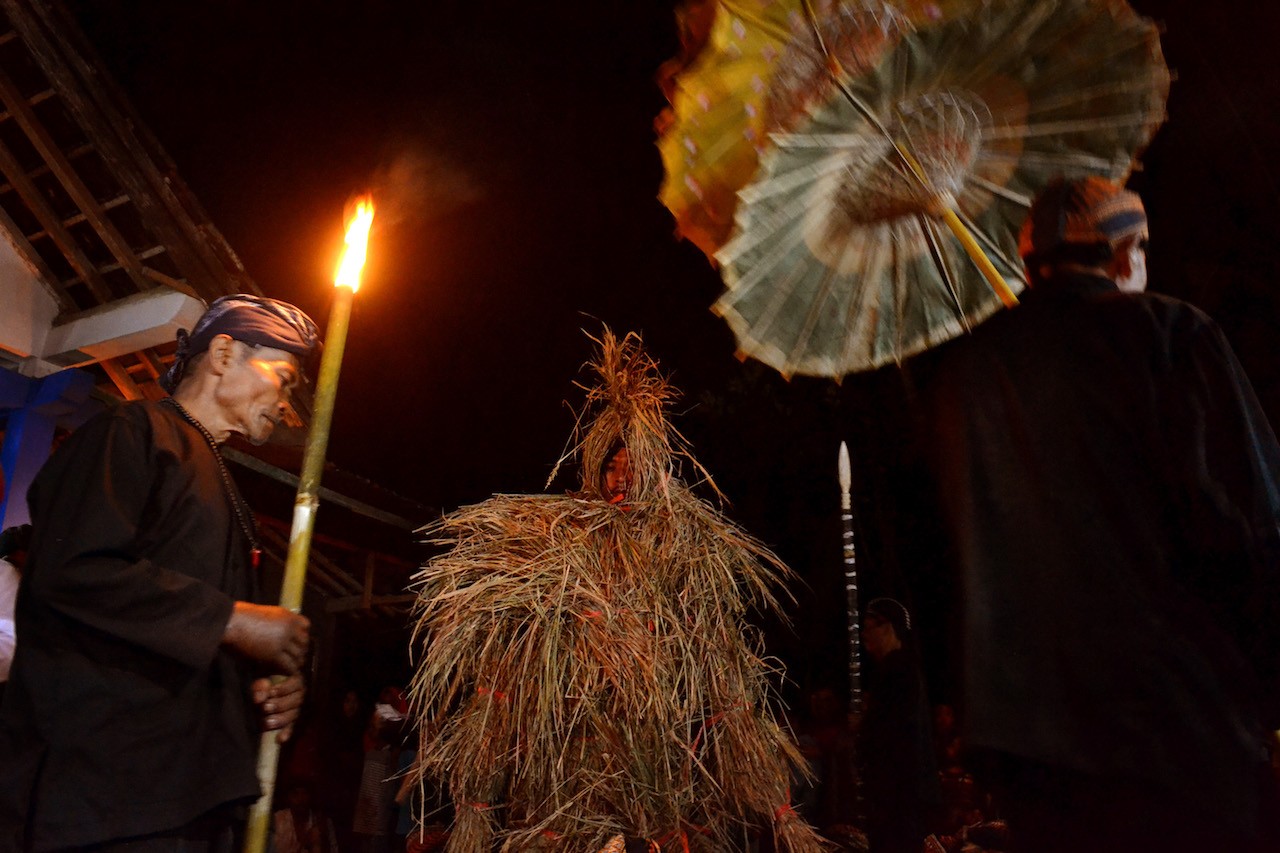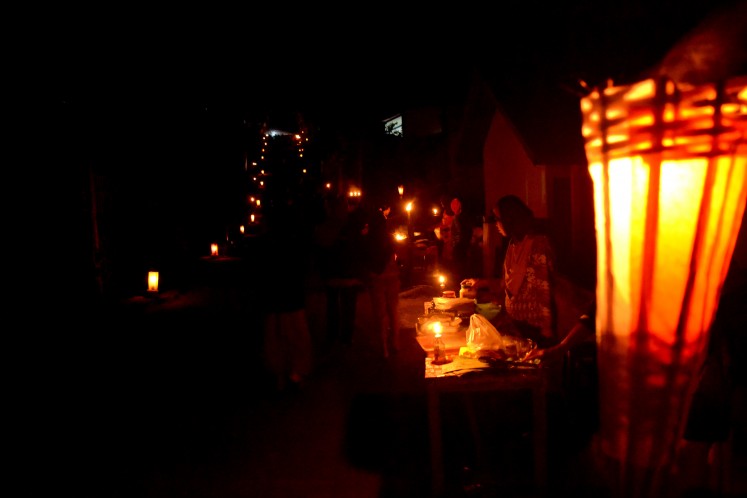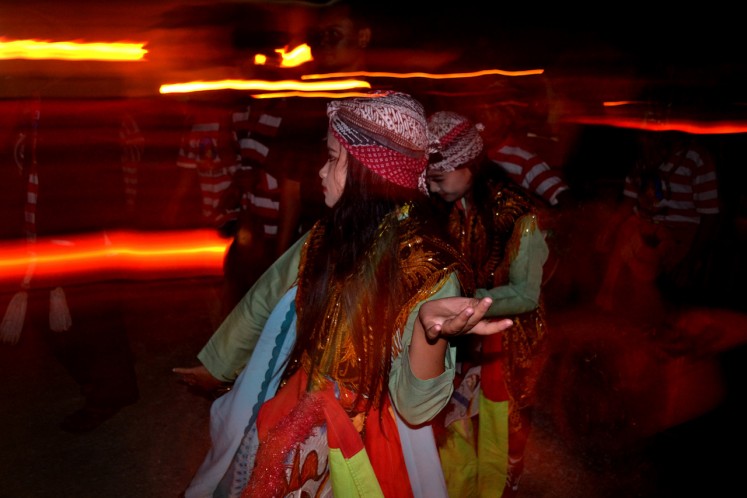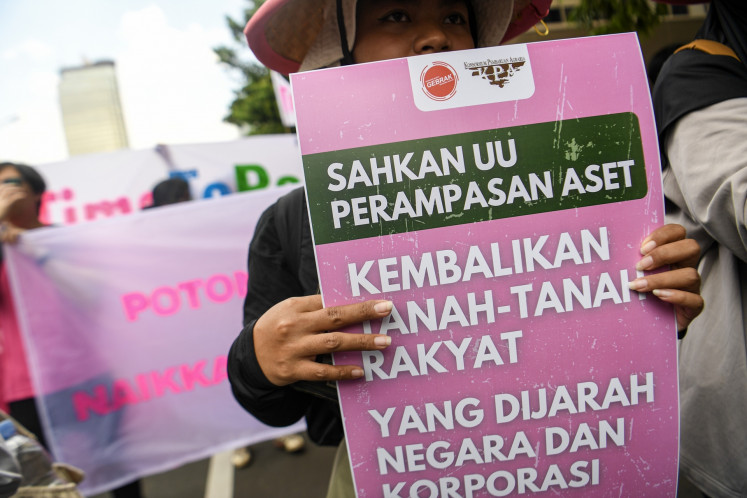Popular Reads
Top Results
Can't find what you're looking for?
View all search resultsPopular Reads
Top Results
Can't find what you're looking for?
View all search resultsThintir Market brings cultural heritage to life
Change text size
Gift Premium Articles
to Anyone
Lit with hundreds of kerosene lamps, a mysterious mood emanated from the narrow path in Noyu hamlet, Jenawi village in Central Java.
The lamps, called thintir in the local language, replaced electric street lighting in Noyu that night, while villagers also turned off the electric lights in their houses.
That night, Thursday, May 3, the residents of Noyu purposefully lit their neighborhood with only thintir and the bright stars in the sky. They were holding the Pasar Thintir (thintir market), with the theme budoyo rikolo semono (culture of the past).
The streets of Noyu village lit by hundreds of kerosene lamps. (JP/Stefanus Ajie)Pasar Thintir was attended by hundreds of Noyu villagers and other people from neighboring villages. They were excited to reminisce about evenings of the past, while munching on traditional delicacies and watching performances depicting the bygone era.
Traditional food, made from local produce from Noyu village, included grontol (boiled corn topped with grated coconut), gethuk (sweet snack made of cassava), and pecel puli (vegetable salad with rice crackers). All were served in organic wraps such as teak and banana leaves.
The mouth-watering treats were offered by women from Noyu, while other visitors indulged in simple snacks such as boiled corn, peanuts and bananas paired with hot tea or warm ginger drinks as they sat on mats spread along the roadside.
Read also: Indonesia Outdoor Festival to return in May
Pasar Thintir began with a procession carried out by the elders of Noyu village, who paraded and chanted prayers. The parade also featured the Kebo Kinul figure, a giant scarecrow made of straw, considered a sidekick of the farmers.
Kebo Kinul also refers to a folk play often performed by children in the past to celebrate harvest. The elders paraded in a circle around the gigantic figure, singing the traditional song Tembang Macapat Pangkur to thank Mother Nature. The song also expressed the villagers’ wishes for a harmonious life and abundance.
The procession signals the agrarian people’s close relationship to Mother Nature, as their source of living. It is also a message for human beings to always preserve nature.
The art performances were then followed by dolanan anak (traditional children’s games), bamboo music, and a Reog dance (a dance that demonstrates physical strength and features extravagant costumes including masks).
A 'Reog' dance enlivened the Pasar Thintir festivities (JP/Stefanus Ajie)The schedule for Pasar Thintir began in the morning with the residents cleaning up the river that flows through their village. There were also workshops on organic farming, on making fertilizers and nature conservation based on the ancestors’ local wisdom.
Endro Ristanto, a Noyu resident who took part in organizing the event said that Pasar Thintir carried a mission to bring cultural heritage back to everyday life. According to him, culture, nature conservation and spirituality should be inseparable from the lives of the villagers.
“We promote local values from the past, the legacy from our ancestors, who bowed to Mother Nature, and farmed without doing harm to the environment, and the children who played outdoors, close to nature. All are depicted through the performances,” said Endro.
More than merely nostalgia, the festivities aimed to celebrate the values of the past to help the participants lead better lives in the future. (mut)









